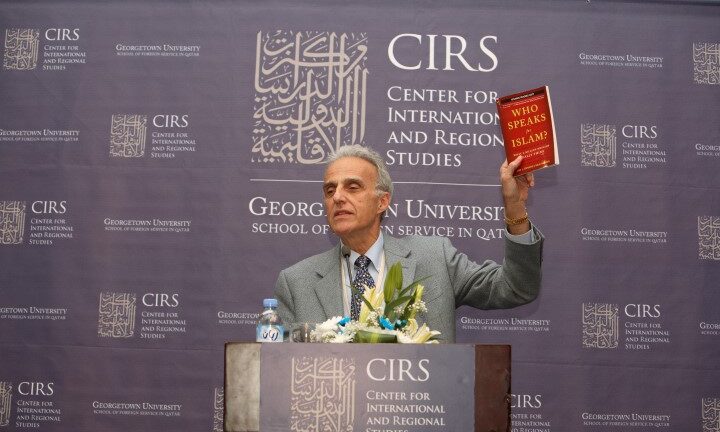Dialogue Series, Race & Society, Regional Studies
John Esposito on What a Billion Muslims Really Think

World-renowned scholar and prolific author John L. Esposito spoke to an audience of nearly 400 guests on February 17, 2008 at the Diplomatic Club in Doha. In his remarks, the Georgetown University Professor of Religion and International Affairs covered the findings of his latest book, Who Speaks for Islam: What a Billion Muslims Really Think.
As the Founding Director of the Prince Alwaleed bin Talal Center for Muslim-Christian Understanding at the Walsh School of Foreign Service at Georgetown University, Esposito emphasized that throughout his career he has been repeatedly asked the same questions regarding Islam: Is Islam compatible with democracy? What is the relationship between Islam and modernity? And, what about Islam is particularly violent? According to Esposito, such questions affirm this clear clash of perceptions between the West and the Muslim World. The problem, he said, is that extremists and terrorism have too often been amplified in the media, consequently overshadowing the hopes, fears, resentments, and realities of a billion Muslims globally. Rather than lend credence to an extreme minority, Esposito, along with the Gallup Center for Muslim Studies, decided to compile data and give voice to a silenced majority—which will enable the public to get beyond ideologies and ignorance.
Who Speaks for Islam? What a Billion Muslims Really Think is based on six years of research and more than 50,000 interviews representing 1.3 billion Muslims who reside in more than 35 nations with predominant or sizable Muslim populations. Representing more than 90 percent of the world’s Muslim community, this poll is the most comprehensive and revealing study of its kind.
Esposito focused his talk on the main findings of the survey as they relate to the clash of perceptions, double standards of US foreign policy, and the need to promote democratization and economic development in the Muslim world. Before delving into policy grievances, Esposito highlighted the perception problem as a glaring difference between what Muslims admire about the West, and what Westerners admire about the Muslim world. The majority of Muslims interviewed stated an admiration for Western ideals of democracy, rule of law, political participation, accountability, economic growth, and technology. However, despite the increased awareness of Islam and Muslims in the West in the post 9/11 era, 57% of Western respondents said they admired nothing or couldn’t think of anything they admired about the Muslim world. Here, the clash of perceptions becomes evident, where the war against terrorism translates into a war against Islam.
Esposito maintained that this is a fragile delineation, because many Muslims view the war against terror as an excuse to redraw the map of the Muslim world. With the persistent denigration of Islam and Muslims, many Muslims are seriously concerned that the West in general and America in particular operate with a double standard when it comes to the Middle East and the larger Muslim world. When we look into the consequences of 9/11, Esposito argued, the reality is that many countries in the Muslim world have become more authoritarian; thereby thwarting movements towards democratization. Thus, this stands in contradiction to the US administration’s push for democracy in the region. Esposito argued that the US democracy promotion policy was “not an export of self-determination but the export of a particular brand of democracy.” Furthermore, not only do Muslims want greater democratization within their countries, but “young Muslims want jobs, not jihad.” Hence, not only are Muslims frustrated with their domestic policies as well as with US foreign policy, but more poignantly, they are also disappointed about the lack of opportunity and economic mobility in their own countries.
Esposito recommended that the way forward for the West and the US is to emphasize soft power rather than military power. When speaking about America’s role in the Muslim world, he recommended that the United States must use the carrot and stick approach. More specifically, the US and the West have to honestly promote freedom, civil society, and human rights in countries that they offer aid and support to. These countries have an important role to play in flexing their muscles in order to address governments that marginalize their people.
According to the Gallup research, both the West and the Muslim world care about the future, but each thinks that the other side doesn’t. Both agree that there needs to be greater interaction, exchange and education. Respect and partnership should be central to Western and Muslim foreign policies. It is more about policy than principles. At a time when sensationalist headlines often eclipse and undermine mutual understanding between Western and Muslim communities, it is essential to engage in meaningful dialogue and discourse.
Esposito told his audience, “I see light at the very end of the tunnel. It is going to take years for us to get out of where we are.”
Summary prepared by Aalaa Abuzaakouk. Aalaa serves as a Student Affairs Officer at the Georgetown University School of Foreign Service in Qatar.